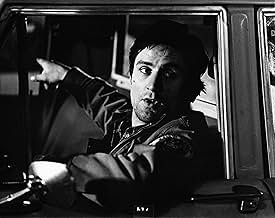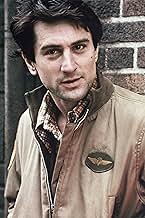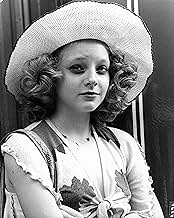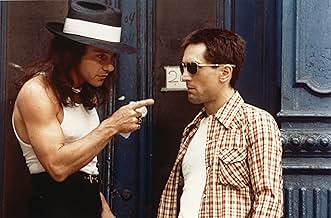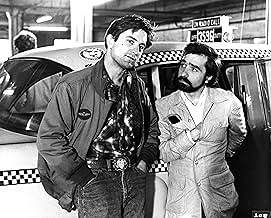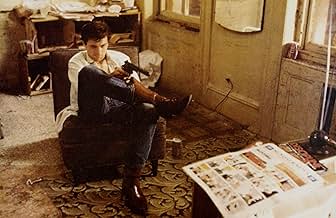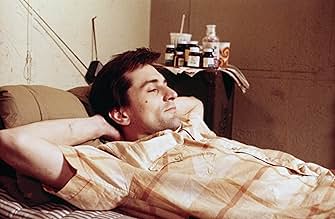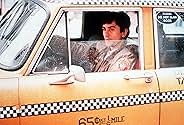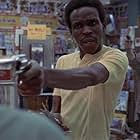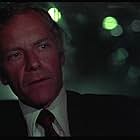A mentally unstable veteran works as a nighttime taxi driver in New York City, where the perceived decadence and sleaze fuels his urge for violent action.A mentally unstable veteran works as a nighttime taxi driver in New York City, where the perceived decadence and sleaze fuels his urge for violent action.A mentally unstable veteran works as a nighttime taxi driver in New York City, where the perceived decadence and sleaze fuels his urge for violent action.
- Nominated for 4 Oscars
- 22 wins & 21 nominations total
Diahnne Abbott
- Concession Girl
- (as Diahnne Abbot)
Victor Argo
- Melio
- (as Vic Argo)
- Director
- Writer
- All cast & crew
- Production, box office & more at IMDbPro
Summary
Reviewers say 'Taxi Driver's' ending is highly controversial and open to interpretation, leaving viewers questioning whether Travis Bickle is a hero, villain, or something in between. The ambiguity contributes to the film's lasting impact and relevance. Some believe Travis lives and is hailed as a hero, while others think he dies or experiences a dream-like sequence. This lack of clarity reflects Travis's complex character and the themes of isolation, violence, and societal neglect.
Featured reviews
Not only one of Scorsese's best films, but one of the best of the 70s. It is very hard hitting, dark and still has the resonance and power to shock. The cinematography is measured and chilly, yet very atmospheric, while Bernard Hermann's swansong score is superb, yet more proof at how amazing a composer he was. The story is unsettling but wonderfully told, and the script is brilliantly written. Scorcese also directs impeccably, while the acting is just excellent. Robert DeNiro gives one of his best performances, the whole film is worth watching just for his performance, that's how good it is, but that's not to dismiss Jodie Foster, Harvey Keitel and Cybill Sheppard in the supporting cast for they are just as good while Scorsese's own cameo is genuinely frightening. There you have it, another one of Scorsese's best with a brilliant atmosphere and mesmerising central performance. 10/10 Bethany Cox
One of powerful, for its profound honesty, films. A man lost in its loneliness. Desiring love, without social abilities, example of schizoidy and full of noble intentions. Robert de Niro gives more than the role of his life but a precise, realistic portrait of a social victim. A great film.
The impact that "Taxi Driver" had in its day hasn't diminished, on the contrary, it has acquired a relevance of Shakesperean proportions. Travis's loneliness is a hyper representation of the same loneliness most humans have experienced at different times in different measures. It is always associated with a nightmare and Martin Scorsese delivers it like a nightmare. Travis, possessed by Robert De Niro at the zenith of his powers, cruises in his taxi enveloped in Bernard Herrman and we, well, we're the passengers and everything looks terrifying and familiar at the same time. Paul Schrader sensational screenplay comes to life with the jolting force of a rude awakening. Like it happens, more often than not, with masterpieces, it signed in a rather direct way the lives of the ones who live it in a movie theater and the ones who made it. Scorsese being the giant that he is, survived it and will continue startling us I'm sure but I also bet that for years everything he did was compared to this movie. De Niro and his "You looking at me" became such an iconic phrase that even he himself ended up impersonating it. Jodie Foster awoke the insane devotion of a real life would be killer and New York, the greatest city in the world was shown with its underbelly up. A work of art, a superlative reminder of what film could actually give us and very rarely does.
Taxi Driver (1976)
**** (out of 4)
Scorsese's masterpiece is a raw, powerful and nerve wrecking look at depression and loneliness. The film centers on taxi driver Travis Bickle (Robert De Niro), a man clearly with his own demons who finds a purpose in life when he meets a 12-year-old hooker (Jodie Foster) who he plans on saving from her pimp (Harvey Keitel). To me this is one of the richest films ever made and it's one that can easily be overlooked in some circles if you don't really connect to what the film is trying to say. I didn't care too much for the movie the first few times I watched it because I was too young to really understand depression and loneliness. After I understood what those things could do to a person is when I fully became aware of the power in this film and today it remains one of the most powerful films ever made. To me the entire film is pretty much about Travis trying to find someone to fit in with but of course it never really happens until he meets the hooker. He tries fitting in with the Cybill Shepherd character but falls flat on his face. He tries fitting in with his co-workers but that doesn't work out too well. No matter what Travis tries he keeps ending up alone and as he put it, he's God's lonely man. This film works on so many levels but I think the psychological one is where it's best at. Getting us into the mind of Travis works for many reasons but the biggest keys are the direction by Scorsese, the brilliant music score by Bernard Herrmann and DeNiro's groundbreaking performance. Putting those three things together is what makes this a classic but we can also throw in the screenplay by Paul Schrader, which rightfully gives the movie the time and patience to let the Travis character grow right in front of our eyes. DeNiro's performance is certainly one for the ages, although I think he would get even better with Scorsese's RAGING BULL, which would follow in four years. His performance here is nothing short of amazing because you can't help but be terrified by this guy because of the look in DeNiro's eyes. You can't help but feel sorry for him at the same time because there are countless moments where he embarrasses himself because he simply doesn't know how to fit in. The word anti-hero gets used a lot and perhaps that's a good term but I think it's something much deeper than that. DeNiro hits all the right marks without a false note anywhere. Foster is also impressive in her few scenes in the film as is Keitel as the pimp. Shepherd is also good as his Albert Brookes and the underrated Peter Boyle who has one of the best scenes in the movie where he's trying to talk some sense into Travis. The visual look of the film is mighty impressive and Scorsese's directing style is nothing short of amazing. The slimy looking streets and the dark atmosphere are one of a kind and something many films tried to copy but could never get it as perfect as it is here. This here remains one of the greatest American films ever made and I'm really not sure any movie could top it in showing the effects that loneliness can have on a person.
**** (out of 4)
Scorsese's masterpiece is a raw, powerful and nerve wrecking look at depression and loneliness. The film centers on taxi driver Travis Bickle (Robert De Niro), a man clearly with his own demons who finds a purpose in life when he meets a 12-year-old hooker (Jodie Foster) who he plans on saving from her pimp (Harvey Keitel). To me this is one of the richest films ever made and it's one that can easily be overlooked in some circles if you don't really connect to what the film is trying to say. I didn't care too much for the movie the first few times I watched it because I was too young to really understand depression and loneliness. After I understood what those things could do to a person is when I fully became aware of the power in this film and today it remains one of the most powerful films ever made. To me the entire film is pretty much about Travis trying to find someone to fit in with but of course it never really happens until he meets the hooker. He tries fitting in with the Cybill Shepherd character but falls flat on his face. He tries fitting in with his co-workers but that doesn't work out too well. No matter what Travis tries he keeps ending up alone and as he put it, he's God's lonely man. This film works on so many levels but I think the psychological one is where it's best at. Getting us into the mind of Travis works for many reasons but the biggest keys are the direction by Scorsese, the brilliant music score by Bernard Herrmann and DeNiro's groundbreaking performance. Putting those three things together is what makes this a classic but we can also throw in the screenplay by Paul Schrader, which rightfully gives the movie the time and patience to let the Travis character grow right in front of our eyes. DeNiro's performance is certainly one for the ages, although I think he would get even better with Scorsese's RAGING BULL, which would follow in four years. His performance here is nothing short of amazing because you can't help but be terrified by this guy because of the look in DeNiro's eyes. You can't help but feel sorry for him at the same time because there are countless moments where he embarrasses himself because he simply doesn't know how to fit in. The word anti-hero gets used a lot and perhaps that's a good term but I think it's something much deeper than that. DeNiro hits all the right marks without a false note anywhere. Foster is also impressive in her few scenes in the film as is Keitel as the pimp. Shepherd is also good as his Albert Brookes and the underrated Peter Boyle who has one of the best scenes in the movie where he's trying to talk some sense into Travis. The visual look of the film is mighty impressive and Scorsese's directing style is nothing short of amazing. The slimy looking streets and the dark atmosphere are one of a kind and something many films tried to copy but could never get it as perfect as it is here. This here remains one of the greatest American films ever made and I'm really not sure any movie could top it in showing the effects that loneliness can have on a person.
Travis Bickle is a Vietnam veteran who cannot sleep at night and just ends up travelling around. To try and use the time effectively he becomes a taxi driver. Things start to look up for him as he works nights and slowly starts to live a little bit. He meets a girl, Betsy, and arranges to see her a few times despite the fact that he is a little bit out of the ordinary a quality that seems to interest her. His connection to the night allows him to see young prostitute Iris being bullied by her pimp Matthew and he begins to see his role to perhaps save her him playing his part in cleaning up the sewer that he feels New York has become. However when his view of normal life puts Betsy off him he starts to retreat more and more into the night, looking for meaning in his life and growing more and more outraged by the world he is part of.
Hardly the most uplifting of films it is engaging and impressive and truly deserves the reputation it has. Martin Scorsese and Paul Schrader have produced a film that convincingly portrays a man cut out of society who has the slightest connection to normality before finding it eroded away. The script is brilliant because the detail is engaging but it is this descent into a very modern type of madness that drives the film forward. Travis has just enough about him that is recognisable that it makes it so easy to go along with the rest of his madness. A major part of this is getting the feeling right about living in a cesspit; a city that seems to have forgotten its way morally New York is the strongest example but elements of it could be parts of any city I suspect. In painting this world in such a real way, Scorsese has made Travis all the more convincing and, to a point, all the easier to follow in his fall. Like I said it is not a film to morally uplift you but one that is depressingly fair. There is no redemption in this modern world and although it appears that the violence at the end somehow redeems Travis in reality by showing "society" accepting his action it drags the rest of us down nearer the world that he hates and has become part of. I love King of Comedy for the same reason albeit in a different world.
Scorsese injects a real understanding of the place and a real sense of foreboding into even the earliest scenes. He inserts clever and meaningful shots into scenes that other directors might just have filmed straight and his choice of scene and shot compliments the script is depicting Travis descending into madness. What makes the film even better is De Niro showing the type of form that makes his recent form such a major disappointment. He is outstanding as he moves Travis from being relatively normal to being eaten up from the inside out. His eventual implosion is impressive but it is only as impressive as the gradual slide he depicts over the course of the film. Although he dominates it, others impress as well. Foster stands out in a small role, while Keitel makes a good impression as the pimp. Shepherd is not quite as good but her character was not as well written as the others so it isn't all down to her. Regardless, the film belongs to De Niro and although the quotable scenes are the ones that are remembered it is in the quieter moments where he excels and shows genuine talent and understanding.
Overall an impressive and morally depressing film that deserves its place in cinematic history. The portrayal of a city and a man slipping into moral insanity is convincing and engaging and it shows how well to "do" modern madness and the effects of the moral void of parts of society. Scorsese directs as a master despite this being at an early stage in his career and De Niro is chillingly effective as he simply dominates the film in quiet moments and quotable moments alike. I rarely use phrases like "modern classic" because I think they are lazy but this is one film that certainly deserves such a label.
Hardly the most uplifting of films it is engaging and impressive and truly deserves the reputation it has. Martin Scorsese and Paul Schrader have produced a film that convincingly portrays a man cut out of society who has the slightest connection to normality before finding it eroded away. The script is brilliant because the detail is engaging but it is this descent into a very modern type of madness that drives the film forward. Travis has just enough about him that is recognisable that it makes it so easy to go along with the rest of his madness. A major part of this is getting the feeling right about living in a cesspit; a city that seems to have forgotten its way morally New York is the strongest example but elements of it could be parts of any city I suspect. In painting this world in such a real way, Scorsese has made Travis all the more convincing and, to a point, all the easier to follow in his fall. Like I said it is not a film to morally uplift you but one that is depressingly fair. There is no redemption in this modern world and although it appears that the violence at the end somehow redeems Travis in reality by showing "society" accepting his action it drags the rest of us down nearer the world that he hates and has become part of. I love King of Comedy for the same reason albeit in a different world.
Scorsese injects a real understanding of the place and a real sense of foreboding into even the earliest scenes. He inserts clever and meaningful shots into scenes that other directors might just have filmed straight and his choice of scene and shot compliments the script is depicting Travis descending into madness. What makes the film even better is De Niro showing the type of form that makes his recent form such a major disappointment. He is outstanding as he moves Travis from being relatively normal to being eaten up from the inside out. His eventual implosion is impressive but it is only as impressive as the gradual slide he depicts over the course of the film. Although he dominates it, others impress as well. Foster stands out in a small role, while Keitel makes a good impression as the pimp. Shepherd is not quite as good but her character was not as well written as the others so it isn't all down to her. Regardless, the film belongs to De Niro and although the quotable scenes are the ones that are remembered it is in the quieter moments where he excels and shows genuine talent and understanding.
Overall an impressive and morally depressing film that deserves its place in cinematic history. The portrayal of a city and a man slipping into moral insanity is convincing and engaging and it shows how well to "do" modern madness and the effects of the moral void of parts of society. Scorsese directs as a master despite this being at an early stage in his career and De Niro is chillingly effective as he simply dominates the film in quiet moments and quotable moments alike. I rarely use phrases like "modern classic" because I think they are lazy but this is one film that certainly deserves such a label.
What Scorsese Film Ranks Highest on IMDb?
What Scorsese Film Ranks Highest on IMDb?
Cinema legend Martin Scorsese has directed some of the most acclaimed films of all time. See how IMDb users rank all of his feature films as director.
Storyline
Did you know
- TriviaRobert De Niro has said that despite having won an Oscar for The Godfather Part II (1974), he was still a relatively unfamiliar face, and was only recognized once while driving a New York cab during his research for this film.
- GoofsIn an earlier version, Iris's timekeeper discovers a weapon on Travis, disarms him, then returns it to him as he's leaving. The scene was edited out, but the gun is still in the timekeeper's hand when he looks at his watch.
- Quotes
Travis Bickle: Listen, you fuckers, you screwheads. Here is a man who would not take it anymore. A man who stood up against the scum, the cunts, the dogs, the filth, the shit. Here is a man who stood up! Here is...
- Crazy creditsThe original television version of the film featured the following disclaimer before the closing credits: "To our Television Audience: In the aftermath of violence, the distinction between hero and villain is sometimes a matter of interpretation or misinterpretation of facts. 'Taxi Driver' suggests that tragic errors can be made.- The Filmmakers."
- Alternate versionsOriginal UK cinema and video versions suffered a very brief 1 second sound cut to the scene where Iris unzips Travis's fly in the bedroom. The BBFC finally restored this cut in 1993.
- ConnectionsEdited into Aristokraticheskiy kinematograf: Episode #1.1 (2011)
Details
- Release date
- Country of origin
- Official site
- Languages
- Also known as
- Taksista
- Filming locations
- 87 Columbia Heights, Brooklyn, New York, USA(Travis is buying guns at an apartment in Brooklyn Heights)
- Production companies
- See more company credits at IMDbPro
Box office
- Budget
- $1,300,000 (estimated)
- Gross US & Canada
- $28,262,574
- Opening weekend US & Canada
- $116,458
- Feb 19, 1996
- Gross worldwide
- $28,737,520
Contribute to this page
Suggest an edit or add missing content







